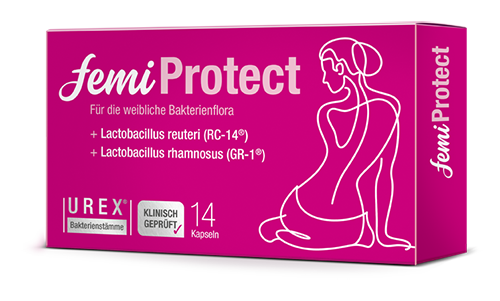
- Nahrungsergänzungsmittel zur Unterstützung der weiblichen Bakterienflora
- Enthält die patentierte und klinisch ausgezeichnet dokumentierte UREX® Stammkombination
- Erhältlich in 2 Packungsgrößen: 14 & 28 Stück
- Exklusiv in Ihrer Apotheke
Einfache Anwendung
- Praktische, kleine Kapsel zum Schlucken: Ideal auch während der Periode
- Nur 1 x täglich einnehmen (1-2 Kapseln)
- Keine Kühlung notwendig!
Klinisch bestätigt
- Eine Kapsel femiProtect enthält mind. 2 Milliarden koloniebildende Einheiten (KBE) der UREX® Stammkombination
- Klinisch geprüft für Frauen ab 16 Jahren, pre- und postmenopausale Frauen sowie Schwangere & Stillende.
Für alle Frauen geeignet
- Klinisch geprüft für Frauen ab 16 Jahren
- Geeignet in der Schwangerschaft und der Stillzeit
- Hochverträglich: frei von Farb- bzw. Konservierungsstoffen, Laktose, Gluten und tierischen Inhaltsstoffen (vegan)

femiProtect und UREX®
femiProtect enthält die patentierten und klinisch untersuchten UREX® Bakterienstämme Lactobacillus reuteri (RC-14®) und Lactobacillus rhamnosus (GR-1®). Beide Stämme wurden aus dem weiblichen Urogenitaltrakt isoliert und kommen natürlich im weiblichen Körper vor.
UREX® wurde insgesamt in über 130 wissenschaftlichen Publikationen beschrieben und gilt das als am besten dokumentierte Probiotikum-Duo weltweit. Der Untersuchungszeitraum erstreckt sich auf bis zu 12 Monate.1
UREX® zeigte in zahlreichen klinischen Untersuchungen mögliche positive Effekte:
- Wiederherstellung und Unterstützung einer gesunden Vaginalflora (z.B. bei bakterieller Vaginose oder Antibiotikaeinnahme)
- Verbesserung von bakteriellen Ungleichgewichten im Urogenitaltrakt (Dysbiose)
- Bei irregulärem vaginalen Ausfluss (z.B. durch Pilzinfektionen)
 Apotheke in deiner Nähe finden
Apotheke in deiner Nähe finden




 Bestelle dir jetzt deine kostenlose Produktprobe und lerne FemiProtect kennen.
Bestelle dir jetzt deine kostenlose Produktprobe und lerne FemiProtect kennen.
